
Transmission lines and railroad near Salton Sea, California. District of Los Angeles smog obscures the sun: photo by Charles O'Rear, May 1972 for the Environmental Protection Agency's DOCUMERICA Project
Train whistle in cold January night
down by the water
lonesome sound
from a long way off
amid memory forest
Harlem Avenue 1947
amid memory forest
Harlem Avenue 1947
or 1948
late
upstairs
in the exile bedroom
at grandparents' house
across from the house
of the mysterious famous gangster
in the dark
under the attic rafters
hour after hour
imagining a meaning
to fit
the brilliant silvery word
Zephyr

Evening train (Albany, California): photo by efo, 6 November 2012
In Evening Train
we witness people on a bus, a window in the night, greenery, a bird on
its perch—and then at the center of this world, something nameless seems
to open. It’s hard to say just what happens, other than the words of
each poem itself. But that isn’t quite right. It’s as if the words are
a way for the poet to inscribe silence. You turn the page, wondering,
and it arrives again—something quite beyond what is told. Tom Clark is a
master.
—Aram Saroyan
A long time fan of Tom Clark’s poetry, I have turned to his books and blog for years to find inspiration, entertainment, and truth. His is a poetry that I can trust—at once spare and direct, witty and uncompromising, personal and universal, intelligent and deeply felt. I rely on Clark to reveal the nation I live in but often fail to see, complete with its environmental degradation, commercial excess, and kitschy spiritualism. His poems live at the intersection of truth and beauty, weaving the threads of the humdrum and the unbearable with the mystical—or at least with a longing for the mystical. Tom Clark is undoubtedly one of the great living American poets.
— Nin Andrews
Tom Clark is a master of surprise. He is a poet twenty-four hours a day and in possession of a very entertaining mind. He gets the familiar and the strange to dance together, and the dance steps are never the ones you expect. There is pathos in the humor of the situation: "First it's stuffed bunnies they're giving you. Next it's ice cream and then the nice surprise -- you're at the hospital, having an operation." Clark has the ability to guide words as they "turn a nowhere into a putative somewhere" -- to take the complications of mental or physical experience and redeem them in lyric poems of notable brevity. Evening Train is smart and companionable and joyously imaginative.
— David Lehman
These poems are radically, almost luridly, American, mapping out landscapes imagined, described, and entered into with stunning visual acuity and incisive intelligence. Yet the language has a spareness, a near egoless authority, giving this book wondrous aesthetic tension. Evening Train confirms what readers of this major American poet have long known: Tom Clark is a contemporary master.
—Terence Winch
—Aram Saroyan
A long time fan of Tom Clark’s poetry, I have turned to his books and blog for years to find inspiration, entertainment, and truth. His is a poetry that I can trust—at once spare and direct, witty and uncompromising, personal and universal, intelligent and deeply felt. I rely on Clark to reveal the nation I live in but often fail to see, complete with its environmental degradation, commercial excess, and kitschy spiritualism. His poems live at the intersection of truth and beauty, weaving the threads of the humdrum and the unbearable with the mystical—or at least with a longing for the mystical. Tom Clark is undoubtedly one of the great living American poets.
— Nin Andrews
Tom Clark is a master of surprise. He is a poet twenty-four hours a day and in possession of a very entertaining mind. He gets the familiar and the strange to dance together, and the dance steps are never the ones you expect. There is pathos in the humor of the situation: "First it's stuffed bunnies they're giving you. Next it's ice cream and then the nice surprise -- you're at the hospital, having an operation." Clark has the ability to guide words as they "turn a nowhere into a putative somewhere" -- to take the complications of mental or physical experience and redeem them in lyric poems of notable brevity. Evening Train is smart and companionable and joyously imaginative.
— David Lehman
These poems are radically, almost luridly, American, mapping out landscapes imagined, described, and entered into with stunning visual acuity and incisive intelligence. Yet the language has a spareness, a near egoless authority, giving this book wondrous aesthetic tension. Evening Train confirms what readers of this major American poet have long known: Tom Clark is a contemporary master.
—Terence Winch
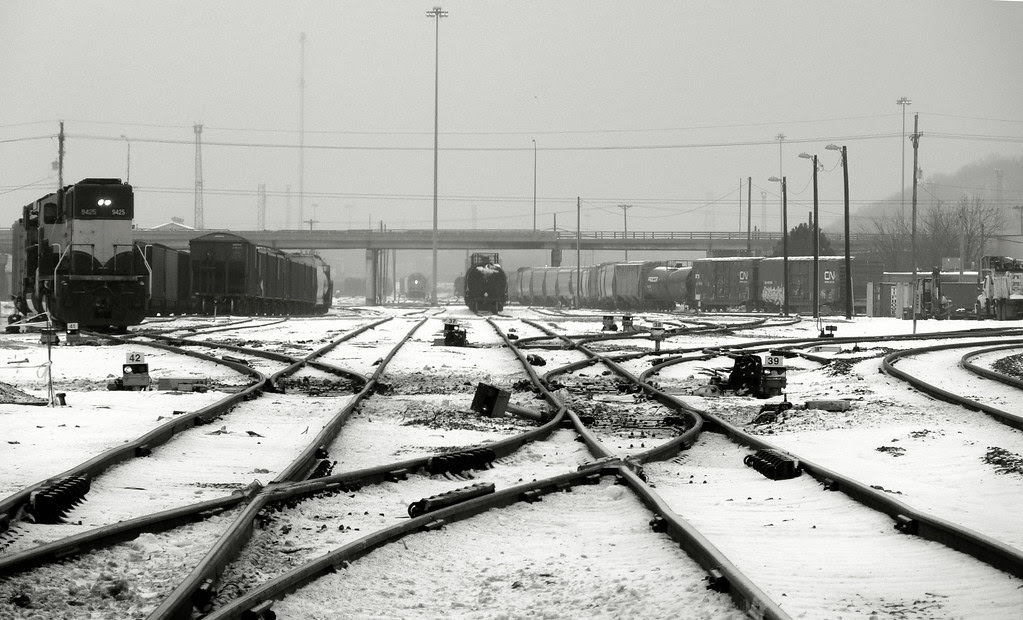
Evening Train by Tom Clark: A Review by Billy Mills
Evening Train by Tom Clark, BlazeVOX Books, 2014, ISBN: 978-1-60964-187-0, $16.00
The first thing to say about Tom Clark is that he is an American
poet; this may seem too obvious to need stating, but it is fundamental
to his art. The language, social norms and history of the United States
are woven into the very fabric of his verse. This is made explicit in
the first poem in Evening Train, ‘Moving House’, where the process of house removal is folded into the myth of Manifest Destiny, a people
…always moving out
ahead of the next wave yet not
riding the last wave to the crest
Clark writes poems that encompass memory (a central preoccupation),
the natural world and our role in it, ageing and death, the interface
between technology and social control: but all these matters are
examined in a landscape that is specifically American and generally
urban. Many of the poems set in the now reflect the geography of the
city of Berkeley, where Clark has lived for many years. For instance,
the almost surreal, apocalyptic poem ‘skyfalling’ is firmly anchored to a
specific street junction in a precise social milieu:
Ninth and Bancroft, West Berkeleyinsecure householder half dressedemerges from behind barred gatelooks up into dark skyone arm bent overhead as if to shield, crouching --

Railway Station, Bielskobiala, Poland, night: photo by czako_o, 16 December 2008
Equally, the poems of memory tend to be firmly located in space and time. For Clark, there is no escape from what was:
There is no such thing
as a clean break
with the past
Chase it off, it comes sneaking
straight back
And so he makes no attempt to chase it off, but holds his memories up
to the light, to examine how his past has made him what he is.

Railway Station, Bielskobiala, Poland, night: photo by czako_o, 16 December 2008
And part of this is a political animal, concerned with questions of
the environment and our relationship with it; his inadvertent killing of
a ladybug leads him to the perception that
Beautiful things ought to be left alone
In a natural state
Frequently, he observes the intersection between this ‘natural state’
and his own urban environment; deer in the city crossing through a
‘lethal stream’ of traffic, for instance. Like memory, nature cannot be
confined, and if you try to it will pop up again where least expected.

Railway Station, Bielskobiala, Poland, night: photo by czako_o, 16 December 2008
Clark is an active blogger,
but his adoption of new technology hasn’t blinded him to the dangers of
‘A generation/mesmerized by/small screens’. These are the opening lines
of ‘Blank (Don’t Be Late)’, the first of a run of poems in the second
half of the book that are concerned with the digital world. In these
poems, Clark imagines a kind of virtual world, with forests of ‘cell
phone tower trees’, a world controlled by computers where people feel
constrained not to speak out for fear of ‘administrative penalties’ and
where even those dependent on medical care are doomed to wait
not for any imaginable compassion
but for the computer
malfunction
to end

Railway Station, Bielskobiala, Poland, night: photo by czako_o, 16 December 2008
Questions of health and mortality are also important to his work. His
poems about death are reminiscent of the work of Cid Corman, the same
matter-of-fact idiom is evident in the writings of both men. In these
poems, a sliver of light through a curtain prefigures the closing of a
coffin lid. In ‘Negative Development’, the perception that ‘Old is a
kind of plague’ follows from the lines:
Death avoidance.A game of tag.An everyday thing.
The untypical heavy end-stopping of the lines enacting the subject in
a carefully crafted stanza.
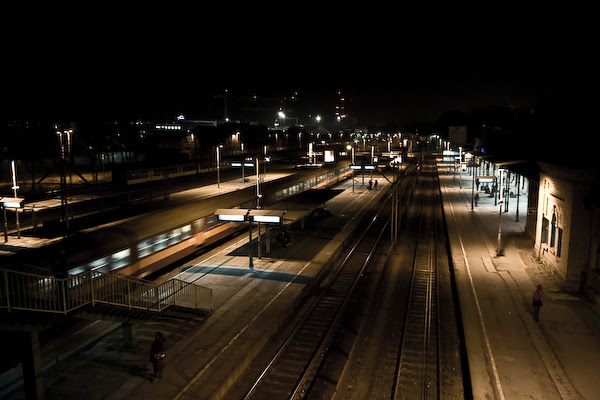
Railway Station, Bielskobiala, Poland, night: photo by czako_o, 16 December 2008
There is an almost Buddhist calm at the
back of Clark’s view of death which, again, reminds the reader of
Corman, an attitude that informs the final poem in the book, ‘Blown
Away’.
unmoored yet not unmovedtossed cloudward, flippedsans volitioninto the flow
 Railway station, Poland: photo by czako_o, 13 February 2007
Railway station, Poland: photo by czako_o, 13 February 2007
*
Clark’s language is, as already noted, pure American. This is
explicit in the poem ‘So Now You Know’, which is a litany of idiomatic
phrases beginning ‘you can blow’, but is really the given condition of
his writing. These poems give the impression of being casually
constructed, conversational, almost easy, but this is just a superficial
impression. If he is engaged in conversation, he takes it to some very
odd places, to silence, as a rule. When you reach the end of one of his
poems, you may not be entirely clear on what exactly has been said, but
you do have a clear sense that there is nothing more to say.
Not that the poems are unclear, the language is as limpid as you
could ask for, the ‘content’ is in no ordinary sense obscure. Whatever
confusion that might arise stems from the fact that the act of reading
does not exhaust the best of Clark’s poems; they linger in the mind like
unresolved questions, inviting contemplation. As the poem ‘Words’ has
it
Even in the middle of nowhere
there are words
words turn nowhere into a putative somewhere.
I can think of no more accurate description of these poems.
-- Billy Mills, from Elliptical Movements, 12 January 2015
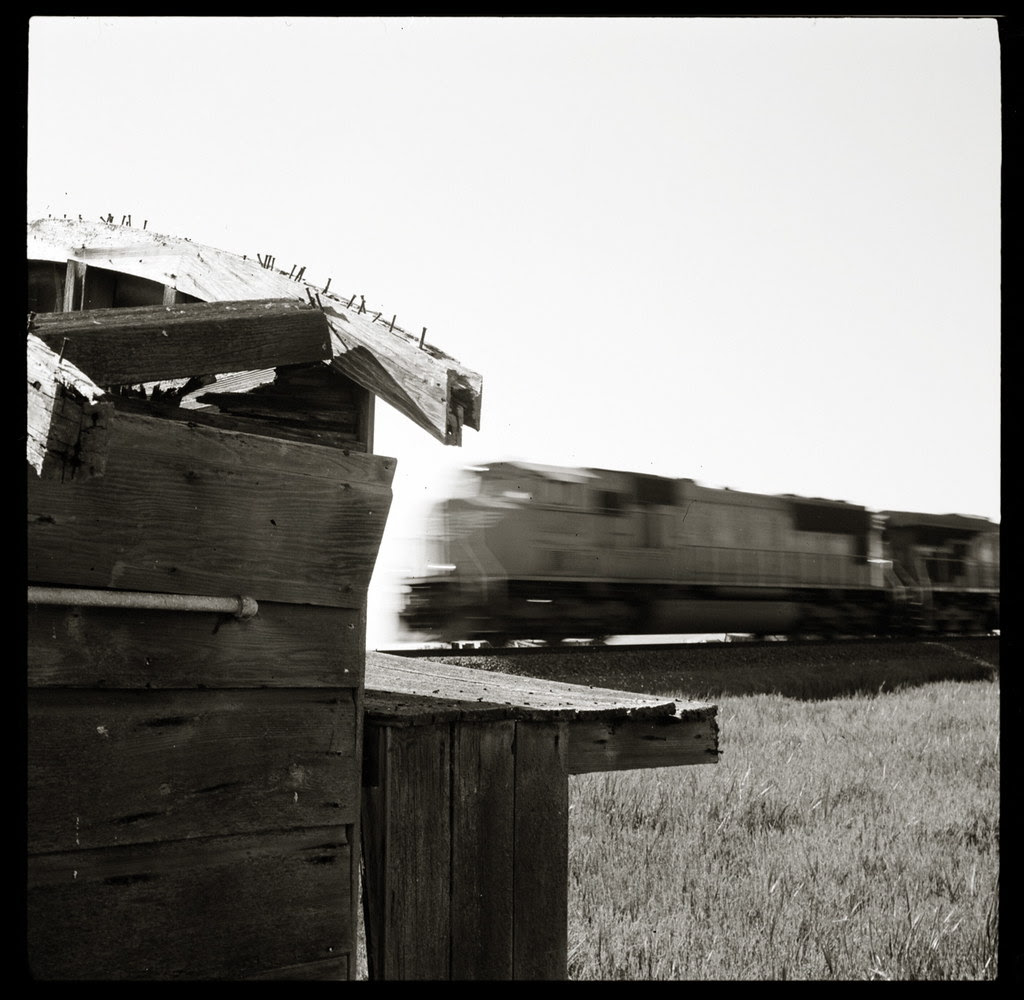
Drawbridge No. 8 (Richmond, California): photo by efo, 27 July 2010

Amtrak train 734 (Pinole, California): photo by efo, 30 April 2006
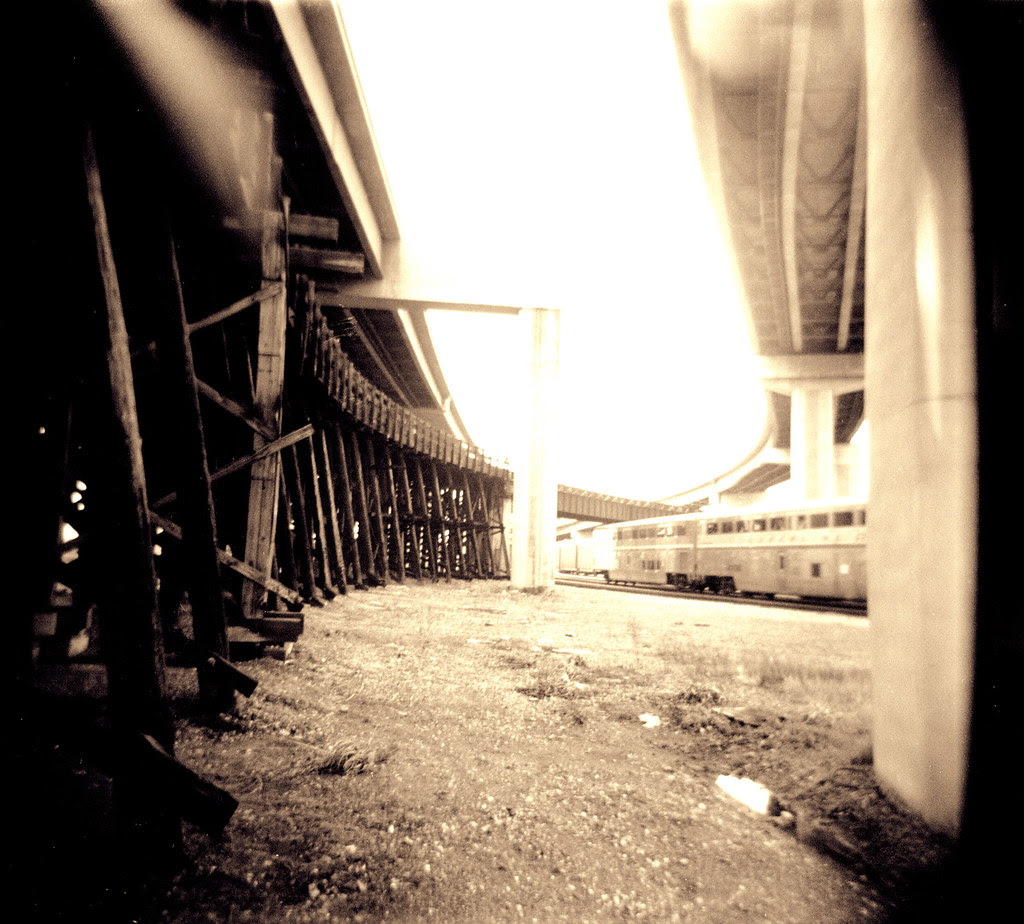
California Zephyr, Oakland: photo by efo, 27 November 2005

The Burlington Zephyr, East Dubuque, Illinois: photo by John Vachon, April 1940 (Farm Security Administration/Office of War Information Collection, Library of Congress)

Chicago, Burlington and Quincy Zephyr streamliner pulling out of Union Station, Chicago: photo by Jack Delano, February 1943 (Farm Security Administration/Office of War Information Collection, Library of Congress)

Chicago, Burlington and Quincy Zephyr streamliner pulling out of Union Station, Chicago: photo by Jack Delano, February 1943 (Farm Security Administration/Office of War Information Collection, Library of Congress)

Chicago, Burlington and Quincy Railroad Denver Zephyr diesel locomotive and older Pennsylvania Railroad steam locomotive side-by-side at Union Station, Chicago: photo by Jack Delano, January 1943 (Farm Security Administration/Office of War Information Collection, Library of Congress)
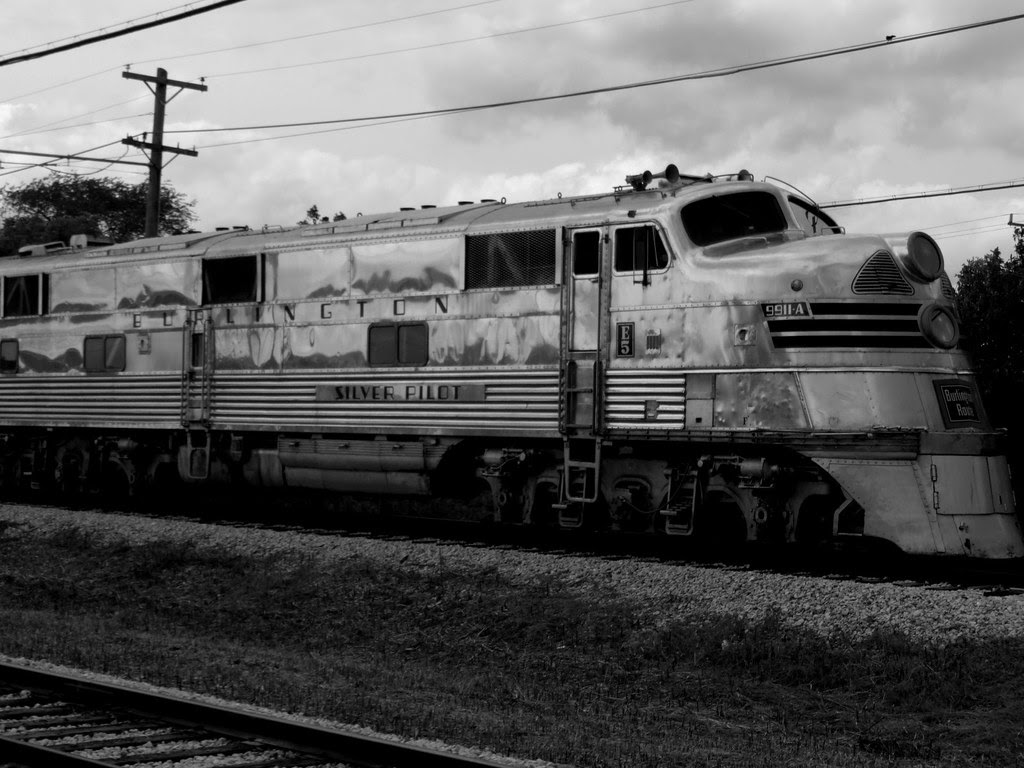
Silver Pilot. E Unit Zephyr, at Illinois Railway Museum, Union, Illinois: photo by cradek23, 12 July 2008
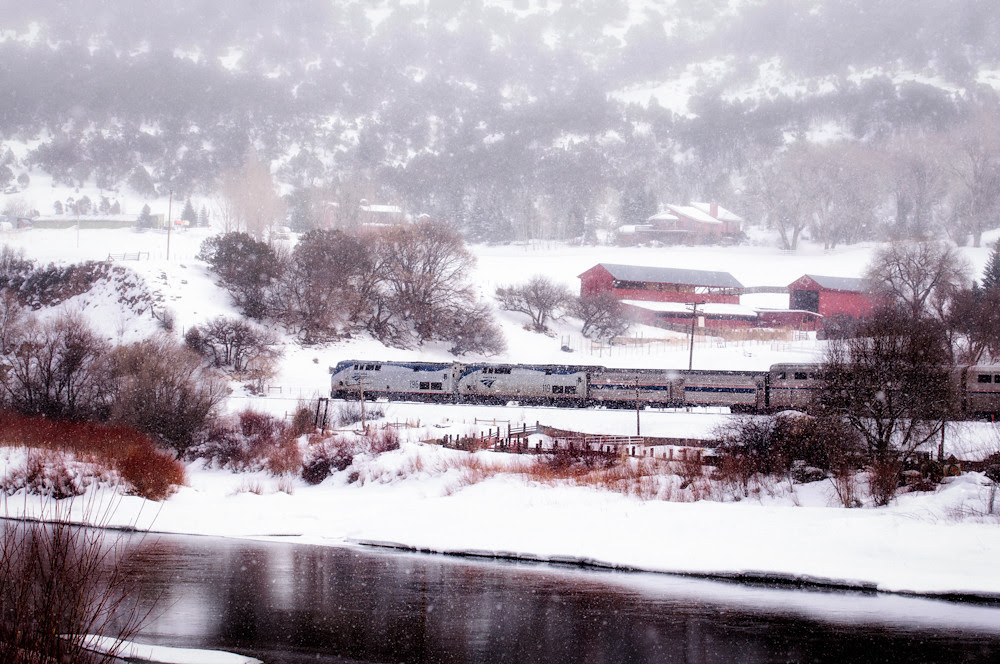
Zephyr, Snowy Glenwood Canyon. The eastbound California Zephyr passes through Glenwood Canyon and along the Colorado River on a snowy February afternoon. In the background, the Bair Ranch has been a working cattle spread since 1919 and now also is a popular small resort. The Glenwood Canyon passage, just east of the town of Glenwood Springs, is one of the most fabled scenic stretches on the Zephyr route: photo by George Hendrix, 6 February 2010
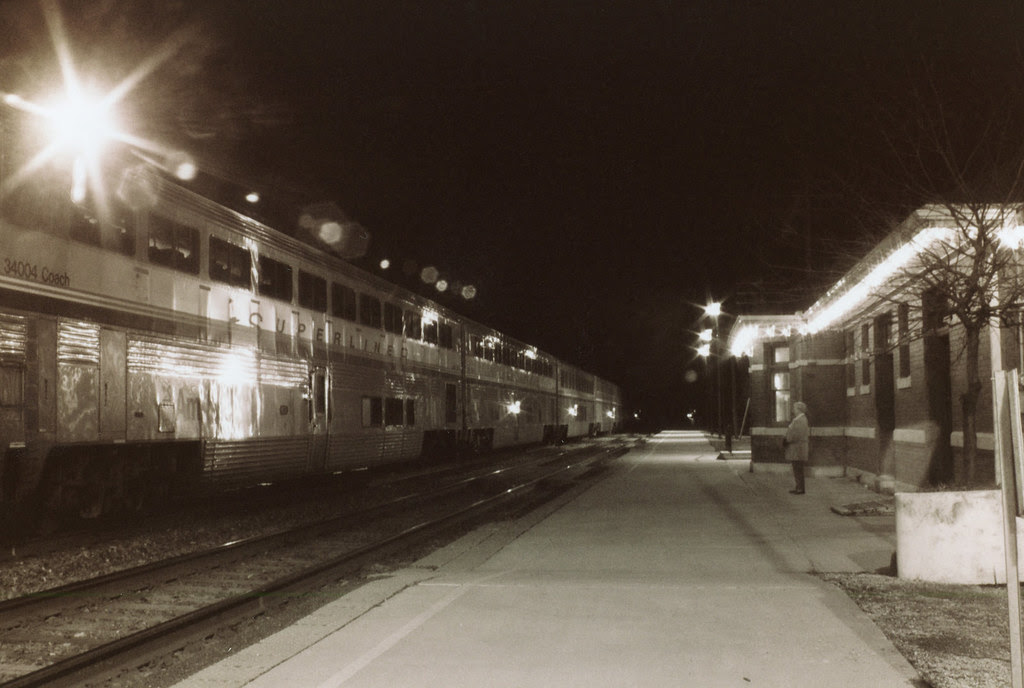
The California Zephyr pauses at Osceola, Iowa on an unseasonably warm February night: photo by lzcdome, 2002, posted 25 October 2009

A slice of history. Nebraska Zephyr with 1959 Edsel, Le Claire, Iowa: photo by Tristan Garrett, 25 July 2011

Chicago, Burlington and Quincy Railroad Twin Cities Zephyr preparing to stop at Prairie du Chien, Wisconsin: photo by Loyd Wollstadt, 1956; image by Roger Wollstedt, n.d.
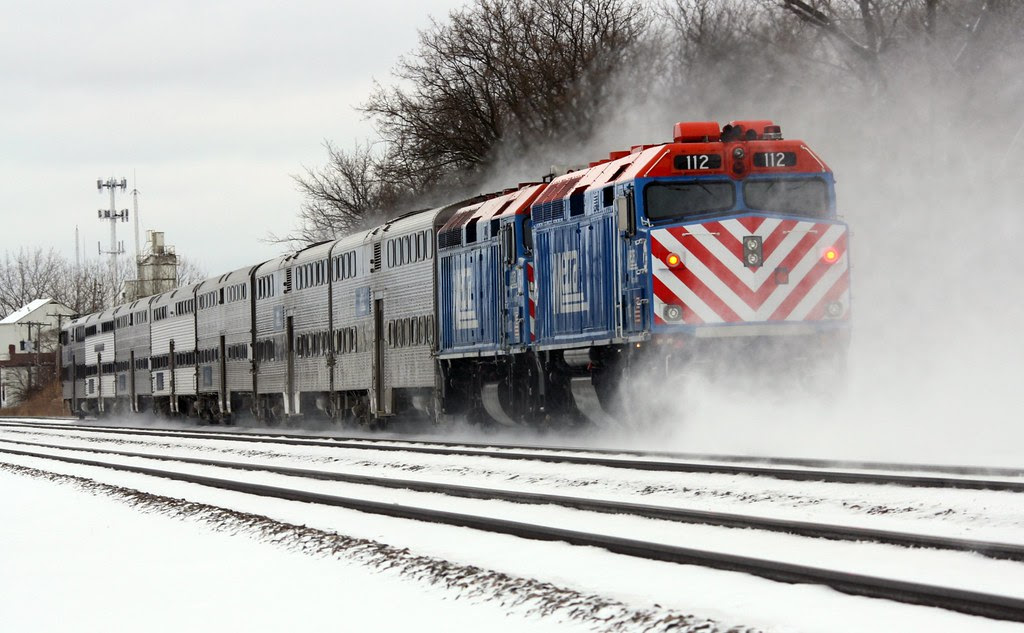
Burlington Northern Metra 112 at Naperville, Illlinois: photo by Laurence's Pictures, 26 December 2010
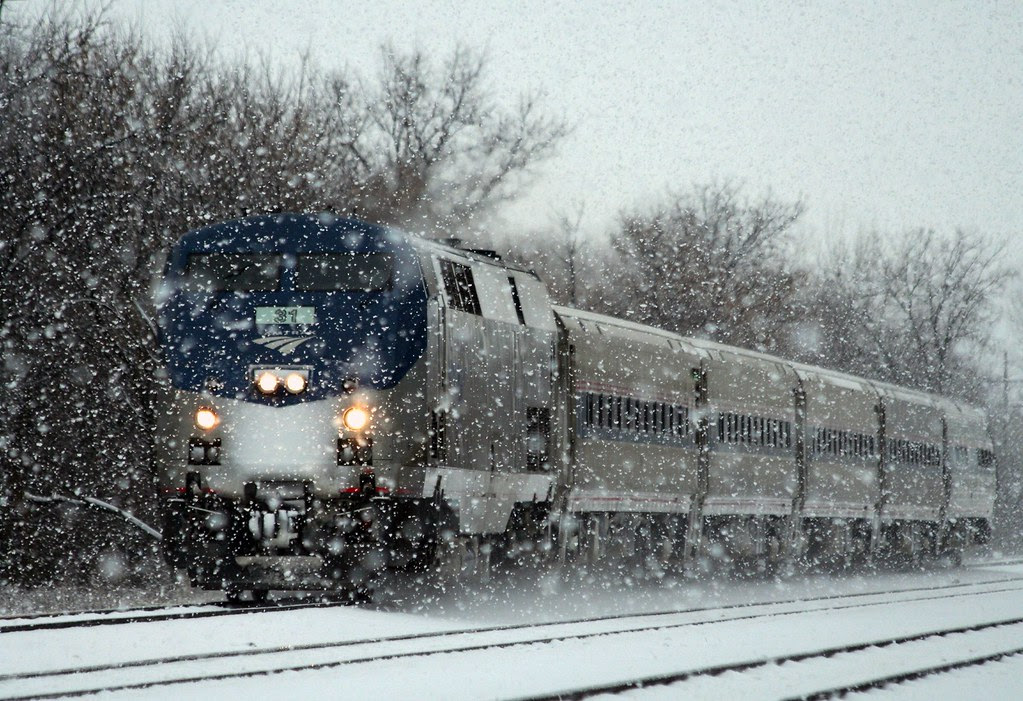
Amtrak's Illinois Zephyr heads east amidst very large snow flakes at Naperville, Illlinois: photo by Laurence's Pictures, 24 December 2008

Nebraska Zephyr at Rock Island, Illinois railway museum: photo by Laurence's Pictures, 21 July 2011

Nebraska Zephyr at Rock Island, Illinois railway museum: photo by Laurence's Pictures, 21 July 2011

View in a departure yard at Chicago and Northwestern Railroad's Proviso yard at twilight, Chicago, Illinois. Brakeman is signaling with a red flare and the train is going by during exposure: photo by Jack Delano, December 1942 (Farm Security Administration/Office of War Information Collection, Library of Congress)

View in a departure yard at Chicago and Northwestern Railroad's Proviso yard at twilight, Chicago, Illinois: photo by Jack Delano, December 1942 (Farm Security Administration/Office of War Information Collection, Library of Congress)



17 comments:
Looking over this obsessive array of Zephyrs it occurs to me that there now live people who were not total train nuts at a critical stage of preadolescent underdevelopment, so... perhaps a word.
In my extremely remote boyhood, in the late 1940s, a degree of freedom perhaps unthinkable now was accorded virtually all children, in a crowded urban milieu; in fact anything that removed one's otherwise annoying presence was never regarded a bad thing, and anyway, on a frigid Saturday morning in the Ice Age before the confusing Discovery of Girls, what better thing was there to do, than to hop the C & NW local downtown, and haunt railway stations.
There were seven big ones, all heavily trafficked. The great unexpected thrill of his period came when, one morning in the vast cold steamfilled engine shed of Union Station, as I stood observing the massive exotic ice chunks on the undercarriages of trains arriving from afar across the vast prairies, a kindly CB & Q driver took pity, invited me into the cab of his silvery Zephyr locomotive (similar to Silver Pilot Class E, specimen shown here, as preserved at Illinois Railway Museum), and permitted me to ride along with him out of the station (as pictured in the three smallish Vachon and Delano FSA b&w's from the Forties), out of the yards and thence about as far west along the line as the spot where in the fifth from bottom shot, here, a modernday Amtrak Zephyr is seen working its way through a snow storm near Naperville... and back again.
Highlight was his demonstration of the meaning and use of the dead man's pedal, a key passage in my early journey through the bright, shiny forests of American endarkenment
The second photo in the post was taken about a mile from right here. We hear those trains in the night. Very Proustian mnemonic for y.t., these later years.
Otherwise, what. This (poem milieu) being Chicago, you will be able to believe that the mysterious famous gangster in the poem was real, I went to high school with his kid. Once in the locker room I saw the son -- his way-beyond-the-rules ducktail unmistakable even (especially) with his back turned -- sitting idly on a bench, casually smoking a cigarette, avoiding gym class, a perfect picture of the routine rule-flouting exceptionalism practised, as I would eventually learn, by mysterious famous gangsters and their offspring, everywhere, all the time.
As to the inevitable element of puffery in a post such as this, what can I say, nobody else was going to do it for me -- the harmless little nonexistent-until-ordered book, last train out of clarksvile, otherwise quietly buried with me mumbling and nodding hopelessly by, as per my current heroic norm. I don't expect anyone to buy it, and indeed don't care much about that, as we'll certainly never see a penny in any case. Welcome to the big time, bozo.
And of course, as the planet boils, cooks, floods, dried out, and the industry rolls on unceasing, why bother anyway, as it's well known around the corner pockets of Ampo (and perhaps not in a good way) I don't make that scene.
"It is the propitious miracle of self-esteem that, since few of us can have brilliant connections or profound attainments, those to whom they are denied still believe themselves to be the best endowed of men, because the optics of our social perspective make every grade of society seem the best to him who occupies it and who regards as less favoured than himself, ill-endowed, to be pitied, the greater men whom he names and calumniates without knowing them, judges and despises without understanding them."
-- Marcel Proust, from Within a Budding Grove, Remembrance of Things Past, Volume I, translated by C. K. Scott Moncrieff and Terence Kilmartin
(I don't know the Irish poet Billy Mils by the way, wouldn't have posted his admirably impartial review if I did.)
I so love your work, this book--one more pearl. And yes, we are swine.
And this review is brilliant.
Gifts for the Dead Valentine
Dear Joe Dear Ben
I’m sending you symbolic
Hawaiian shirts
to wear in heaven
on the hot plains
and hats and scarves
for the draughty hallways
of the winter passage
those subterranean mountains
can be fiery but cold
and the zephyr of the soul
stops at midnight steaming
in the middle of nowhere
for who knows how long
no cure but to endure
Beautiful poem, Tom. I’m looking forward to reading the others in Evening Train.
beautiful !
Many thanks, friends.
Nin, kind words, and you know how hard it must be to grow a pearl -- but no, you are not numbered among the swine.
That wonderful Proust quote was actually an arcane joke in our house re. the publisher, of whom, I suspect, you have already surmised everything we have come, latterly, sadly, to know.
Peter,
Appreciate this latest drop from your protracted Valentine project.
By the by, it's recalled among a few surviving ancients that the introduction of the diesel engine was the death knell for the Age of Steam.
Therefore, in point of fact, a "steaming Zephyr" would be of the same category as a "barking cat" or "purring dog".
Hazen and Sandra,
Super gracias to both of you sweet souls for hanging around here all these years, as these poems were made.
If you hadn't been here, I wouldn't have made them.
Thanks, Tom, for once again making me think about words and the pictures they create, and look at pictures that seem almost beyond the words. Can't wait to read the book.
-David
Railroad history buffs everywhere will undoubtedly be awaiting my further historical explication regarding the transition between technological epochs. In the Forties and Fifties many if not most railroads still ran steam engines, particularly on short-run lines. The Burlington line brought in the Zephyrs, and then the Santa Fe with its Chiefs and Super Chiefs and so on. On the day mentioned in my first comment I rode a Chicago & North Western steam-driven train downtown, as usual, received that amazing and totally irregular and unauthorized clandestine ride on the CB & Q diesel Zephyr, learned about what to do if I ever became an engine driver (tie your foot to a pedal which had to be pressed to the floor at all times, or the train would stop -- if, for example, the driver had a heart attack), then rode back home (stop the presses!) on another steam-driven train.
As to the tying of the dead man's pedal to the floor -- does anyone care? -- the unfortunate consequences of allowing a hurtling train to continue on without a driver can not have been lost on those drivers, but now that I am old and can no longer take for granted the having of feet, it's also not difficult for me to understand that a driver might find standing up while pressing a foot down hard on a pedal for extended periods of time, an onerous chore -- and, in turn, risking catastrophe for survivors of one's own private heart attack, perhaps a lesser evil.
Not to diminish in any way the importance of the public good & c.
David,
Thanks very much, hadn't seen that till just now, and yes, isn't it funny how pictures do indeed make their way inside the viewer in a way that's finally deeper, richer, and stranger than any words could do for the mere picture-deprived reader of words.
Your swell blog, for example, would be a fine example of this interesting phenomenon.
Thanks, Tom, I thought you'd catch that sophomoric use of "steaming", and what you say is true in the physical world, but in heaven the law of reversal holds sway. A kind of evaporation is underway perhaps,
for the subjects of the poem.
Thanks Peter, and it's certainly not sophomoric to have feelings... dunno, long time since sophomore year.
At my high school, the sophomores were isolated in their own "wing" (think: ward), for the sake of the general good
In that wing, we dissected frogs kept in formaldehyde, and learnt that animals are inferior to humans, because they excreted through their mouths.
God works his (probably not her, she'd never do such a thing to an innocent bird) wonders in mysterious ways.
May we all in any case be allowed to evaporate in peace, like the ephemeral clouds, puffs and wisps of steam than which we are barely more substantial, sooner rather than later.
It's no small poetic consolation for all of us to find the god of the west wind practising his cool, refreshing art on the west coast of America--thanks for being there, Tom.
In my little home town, there was a man whose job it was to sit in a tiny shack by the railroad tracks. Originally, his job had been to raise and lower the railroad crossing gates when a train went by, but even when those were automated, the shack and man remained. He wore a safety vest and a hard hat, and when trains went by he'd come out and wave an orange flag, just in case the gates across the road weren't hint enough for passing motorists.
At night, you'd see him sitting there with the light on and a book, and it always seemed like he'd gotten a pretty good deal. Up all night with a book, interrupted only by trains and flag waving! What's better than that?
I just checked Google Street View, and sadly the shack (and man) are gone. But I'm excited to get my hands on this book, even if the perfect spot to read it has vanished.
Oh good news! I was just looking at the wrong street. Looks like shack (and man) are still standing watch.
Nora,
But can you really be sure it is really the same little man and the same little shack and not a clever impersonator in a cunning googly simulation of a far better past?
Hard to trust anything these days, much less the Great Digital Divinities. My guess is that the little guy may well be gone for good, and that Google Streetmap has found a devious way to market Google Glasses by permitting the viewer to see a rose coloured version of everything (on the well tested principle that people see pretty much whatever they want to see anyway, thus unconsiously or perhaps consciously colluding with the forces and powers that show things, and select the things to be shown, and so on).
I pretty much stick with the recalcitrant view that things ain't what they used to be, and never again will be.
There was a story going around back in the later middle of the last century that the Mafia was being run by a certain diminutive, unassuming one-eyed old Sicilian man who ran a newspaper-and-cigar stand in the Bronx and whose great power was demonstrated in the hushed tones with which, when in safe company, one uttered his dread name: Un Occhio.
He's probably not there any more, and as we don't hear much about the Mafia these days (they must be under strict Republican protection), perhaps the vanishing of that little railway man also marks the end of something major, like, say, the climate balance of the planet.
Vassilis,
Thank you for relieving my tattered sails of some of that bothersome wind. Not to speak of all that steam.
You see, there again, world upside down, steaming zephyrs, publishers puffing so hard on their own sails they don't even notice the two-bit huckster there in the mirror, smiling and telling them to have another nice day.
Jeez, and people (well, MFA students) seem to believe that being a poet is an honourable thing. Or do they really believe that?
Maybe they just want to be loved.
But if that's what they want, they should remember that, when they grow old and infirm and have outlived their usefulness (it's that old saw stated by Wordsworth re Chatterton in 1807, still applicable today -- poets in their youth begin in joy and gladness, later on end up sunk in despondency and madness -- "Resolution and Independence"), they are going to get the sort of letter that the AMPO social security division sends out -- in fact the huckster who controls my dwarf publishing fate sent this one along just yesterday, in recognition of my seniority and achievements as well as the critical nous of poor Billy Mills (whose failures to be relevant, it would seem, have accumulated with every mile of distance from the center of the huckster universe, that famously enchanting venue... Buffalo):
"Your books do not sell. No one knows who you are anymore. The only way to get your books reviewed is to have someone 5000 miles away read and write about your work, and there, its not even a very thought provoking review, now is it."
Actually, I thought it was. But, as will be instantly understood by anyone who has been following the historical regression of consciousness in this country, I don't suppose you'd ever expect to provoke thought in a primitive life form.
Glad youliked the review; a most enjoyable book. And the photos are great.
Billy, thanks a million for the absolutely swell review.
Coolio!
Post a Comment